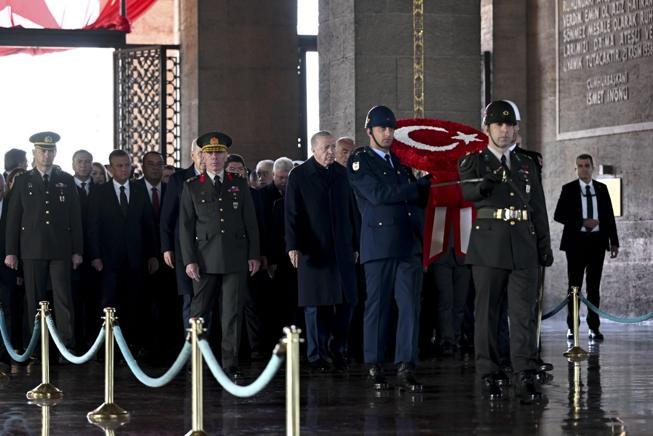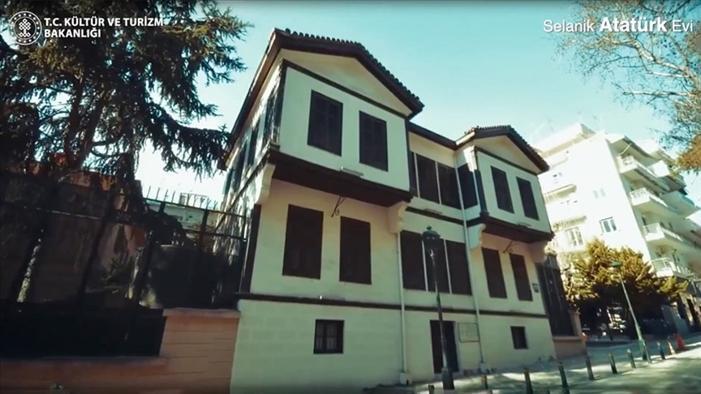
Across Türkiye, life came to a standstill at 9:05 a.m. on Nov. 10 as sirens echoed nationwide in tribute to modern Türkiye founder Mustafa Kemal Atatürk, marking the 87th anniversary of his passing.
For one minute, traffic stopped, pedestrians stood in silence and drivers stepped out of their cars to pay their respects to the visionary leader who transformed the former Ottoman Empire into a modern republic in 1923.
In Ankara, thousands gathered at Anıtkabir, Atatürk’s mausoleum, to take part in the official state ceremony. President Recep Tayyip Erdoğan, military commanders and top officials laid wreaths at his tomb as the national anthem filled the air.
Families, students and visitors from across the country later streamed into the memorial, carrying flags, carnations and photographs of Atatürk.

In Istanbul, the heart of the commemorations was Dolmabahçe Palace, where Atatürk spent his final days and passed away on Nov. 10, 1938.
As early as dawn, thousands formed long lines stretching along the Bosphorus to enter the palace. The official ceremony inside his bedroom, draped with a Turkish flag over the bed where he died, began with a presidential wreath, followed by tributes from the state officials.
At exactly 9:05 a.m., the moment of Atatürk’s death, sirens sounded and visitors bowed their heads in silence. sirens sounded and visitors bowed their heads in silence. Many were visibly moved, some wiping away tears as the national anthem echoed through the halls.
“We are deeply saddened, but not by his absence, for he is always in our hearts. I know that every child of this nation loves him dearly, and that today, we all share the same profound feeling,” said Dilek Ayna, a citizen attending the commemoration.
Another visitor, Mahir Ali Taş, expressed similar emotions: “I feel a profound sense of sorrow. Yet, seeing so many people remembering such a colossal leader warms my heart.”
From the northwestern city of Kırklareli to the eastern province of Iğdır, commemorations took place across the country.
Governors, mayors, soldiers, students and citizens observed a minute of silence in front of Atatürk monuments, followed by the national anthem.
In coastal cities, ferry passengers stood in silence as ship sirens joined the nationwide tribute.
Hundreds of hot air balloons soared above the fairy chimneys of Nevşehir’s Cappadocia, decorated with Turkish flags and portraits of Atatürk.
In Erzurum, members of local hiking clubs marked the day with a 16-kilometer memorial walk. At the summit, participants unfolded a giant Turkish flag and observed a moment of silence for Atatürk amid the mountain landscape.
Despite schools being on a short break, many across the country reopened briefly to hold remembrance ceremonies. Students recited poems and sang songs in honor of the leader whose vision continues to shape modern Türkiye.
Atatürk’s legacy, his reforms in education, women’s rights and secular governance, remains central to the nation’s identity.
Each year on Nov. 10, millions pause to remember not only his passing but the enduring ideals he left behind: Independence, progress and unity.
Atatürk’s family home reopens after full restoration

In Thessaloniki, the birthplace of Atatürk reopened on Nov. 9 following a major restoration led by the Turkish Cooperation and Coordination Agency (TİKA) under the Turkish culture ministry.
The historic three-story residence, where Atatürk was born in 1881, has been meticulously restored to its 1953 layout, preserving its architectural authenticity while incorporating modern conservation techniques.
More than 1,000 artifacts, documents and books have been transported from museums in Türkiye, including 1878 property records, Atatürk’s father Ali Rıza Efendi’s estate documents and a painting of the house by the Turkish painter Rahmi Pehlivanlı.
The museum has been structured around different themes: The basement floor focuses on the history of the house, the middle floor features an ethnographic exhibition and the upper floor is dedicated to Atatürk’s years in Thessaloniki.
Every detail has been restored to its original form, recreating the authentic “Turkish house” atmosphere.
Culture and Tourism Minister Mehmet Nuri Ersoy, who inaugurated the museum on Nov. 9, described the renewed Atatürk House as “not merely a museum, but a cultural diplomacy center that keeps the nation’s collective memory alive.”
“In deep respect for the memory of Atatürk, we will carry out this meaningful opening, thus reconnecting this legacy with its visitors,” Ersoy said in a social media post, emphasizing that the house stands as a symbol of Turkish-Greek friendship.